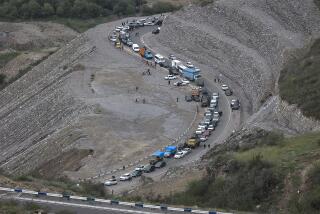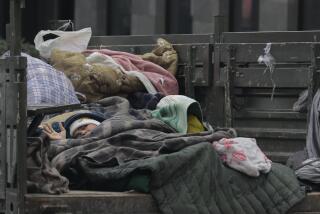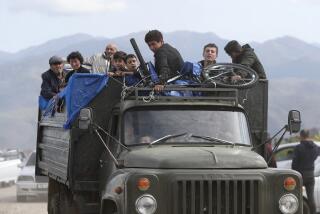Soviets Oust Leaders in 2 Republics : Ethnic Unrest Sparks Removal of Party Chiefs
MOSCOW — The Communist Party leaders in the Soviet Union’s two most troubled republics, Armenia and Azerbaijan, were replaced Saturday following four months of ethnic unrest in both regions.
The changes, announced by the official news agency Tass, were made at special meetings of the local parties’ central committees in the two republics with senior Kremlin officials taking part.
In Armenia, Karen S. Demirchyan, the first party secretary for 14 years, was replaced by a veteran party official who had been the republic’s deputy premier, according to Tass. In neighboring Azerbaijan, Kyamran M. Bagirov, the first secretary for the past five years, was replaced by the former Soviet ambassador to Pakistan.
Concern About Unrest
The moves appear to reflect not only the concern of the Soviet national leadership about the continuing unrest in Armenia and Azerbaijan, but also a determination by Mikhail S. Gorbachev, the party’s general secretary, to take firm action to prevent his broad political, economic and social reforms from being undermined by the ethnic strife there.
Gorbachev’s critics, according to informed Soviet sources, have cited the ethnic unrest in the two republics as evidence that his policies of glasnost , or political openness, and democratization threaten to plunge the country into chaos by unleashing forces, such as strong nationalism, that have been held in check by the rigid discipline of the Soviet system as laid down by the late Josef Stalin.
With the party’s policy-making Central Committee expected to meet here shortly, perhaps as early as Monday, and a full party conference planned for late June to debate the controversial reform program, Gorbachev presumably wants not only to deal with the continuing unrest but to demonstrate firmness in doing so.
Took Part in Meeting
The party’s No. 2 man, Yegor K. Ligachev, took part in the Azerbaijani meeting, and Alexander N. Yakovlev, another member of the ruling Politburo, participated in the Armenian meeting, according to Tass.
The unrest first erupted in February in the mountainous region of Nagorno-Karabakh, an Armenian enclave in Azerbaijan whose residents want to be administered from Yerevan, the Armenian capital, and not from Baku, the capital of Azerbaijan. The mostly Christian Armenians feel they have long been discriminated against by the majority Muslim Azerbaijanis.
The refusal of central authorities to transfer Nagorno-Karabakh led to angry demonstrations in the region and then in other areas, including the capitals of the two republics, and eventually to widespread clashes between Armenians and Azerbaijanis.
In the Azerbaijani city of Sumgait, at least 32 people were killed--26 Armenians and 6 Azerbaijanis--in three days of rioting at the beginning of March.
Combat troops were eventually deployed to restore order, but the disturbances were some of the worst in the Soviet Union in many years.
Crowd of 100,000
New protests now threaten both republics as those arrested in the earlier riots go on trial. On Wednesday, a crowd said to number 100,000 demonstrated in Baku, the Azerbaijani capital, over the burning of an Azerbaijani family’s house 10 days earlier in the Ararat region of Armenia. More than 1,000 families were reported to have fled the area. On Thursday, more than 40,000 people demonstrated in Yerevan, the Armenian capital, to protest as too lenient a 15-year prison sentence given an Azerbaijani youth for murdering an Armenian man in the Sumgait riot. And further demonstrations were reported in both republics on Friday.
Demirchyan, 56, the Communist Party first secretary in Armenia since November, 1974, had come under severe criticism from Gorbachev for economic mismanagement and corruption in the province even before the nationalist demonstrations there in February and March.
According to Tass, he will be succeeded by Suren Arutyunyan, 49, a veteran party official, who has been Armenia’s deputy premier for the past four years.
Bagirov, 55, the party first secretary in neighboring Azerbaijan since December, 1982, was replaced by Abdul-Rakhman Vezirov, 58, another longtime party official, who recently served as the Soviet ambassador to Pakistan and Nepal.
Following ethnic riots in February and March that the official Soviet press has described as “pogroms” against Armenians living in Azerbaijan, the Kremlin sharply criticized the republic’s party leadership for failing to ensure the rights of the Armenian minority living there.
The Tass announcements stopped short of declaring that Demirchyan and Bagirov had been fired.
More to Read
Sign up for Essential California
The most important California stories and recommendations in your inbox every morning.
You may occasionally receive promotional content from the Los Angeles Times.










